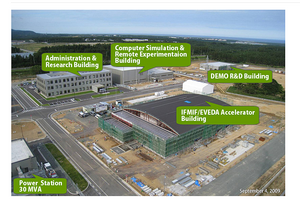News on Broader Approach activities
The Broader Approach Agreement signed in February 2007 between EURATOM and Japan establishes the framework for research and development work "in support of an early realization of fusion energy." News has reached us from Rokkasho and Naka, Japan on the status of the three Broader Approach projects. Project leaders Pascal Garin, Shinichi Ishida, and Masanori Araki describe progress-to-date:
A major step forward has been made toward realizing the advanced superconducting tokamak JT-60SA in Naka, in the prefecture of Ibaraki, Japan. The Integrated Design Report for this device, including the plant integration focument, was adopted by representatives from Japan and EURATOM in Karlsruhe, Germany on 10 December 2008. Once in operation, this upgraded version of the existing JT-60U tokamak will serve as a "satellite" to ITER in order to develop operating scenarios and address key physics issues in support of ITER and the future DEMO power plant. Construction has begun in Naka on the poloidal field coil and poloidal field conductor manufacturing buildings.
Engineering Validation and Engineering Design Activities (EVEDA) are also underway for the International Fusion Materials Irradiation Facility (IFMIF). This facility, whose site is not yet known but managed today from Rokkasho in the prefecture of Aomori, Japan, will be used to test and qualify advanced materials for use in a future fusion power plant. Most of the activities this past year have focused on the preparation of the prototypes that will contribute to validating IFMIF's design. The prototype accelerator, for example, will bring a deuteron beam of 125 mA at an energy of 9 MeV in continuous wave. Through work carried out in France, Spain, Italy, and Japan, the high-energy part of this accelerator was redesigned to integrate modern superconducting half wave resonators. This accelerator will be tested in Rokkasho from 2012 on. Detailed design work has also begun on the Lithium Test Loop in a joint collaboration between Japan and Italy. The Lithium Test Loop will be set up in Oarai on Japan's Pacific coast, and experiments are planned beginning 2011. Thanks to the recent involvement of Belgium in the Broader Approach, test modules and the capsules containing materials samples are scheduled to be irradiated in a Belgian reactor. Preparations are ongoing in Germany and in Japan.
Work also progresses on the establishment of the International Fusion Energy Research Centre (IFERC) in Rokkasho, Japan. Its mission is to contribute to the ITER Project and promote the early realization of DEMO by coordinating design and R&D activities, providing computational simulation of fusion plasmas and reactor technology systems, and carrying out remote experimentation activities designed to facilitate a broad participation of scientists in ITER experiments. Workshops have been held for design/R&D activities with experts from Europe and Japan, and much design work for the installation of DEMO R&D experimental equipment in Rokkasho has been performed. Work-sharing meetings have taken place relating to computational simulation to discuss issues between the Implementation Agencies and the project team. Information exchanges have also begun between ITER Organization and the project team pertaining to remote experimentation.



